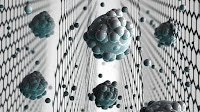Researchers in the United Kingdom have developed a graphene-based sieve that can filter salt out of seawater, a development that could provide drinking water to millions of people around the globe.
The applications could be a game-changer in countries where access to safe, clean, drinkable water is severely limited.
Graphene -- an ultra-thin sheet of carbon atoms organized in a hexagonal lattice -- was first identified at the University of Manchester in 2002 and has since been hailed as a "wonder material," with scientists racing to develop inexpensive graphene-based barriers for desalination on an industrial scale.
Now, the team at Manchester has used a compound of graphene, known as graphene oxide, to create a rigid sieve that could filter out salt using less energy.
Read more at Graphene Sieve Could Make Seawater Drinkable

No comments:
Post a Comment